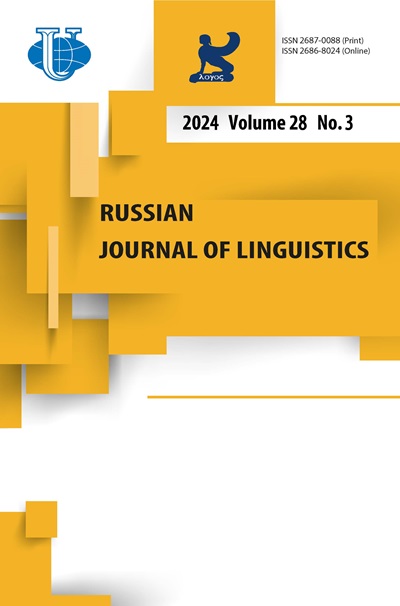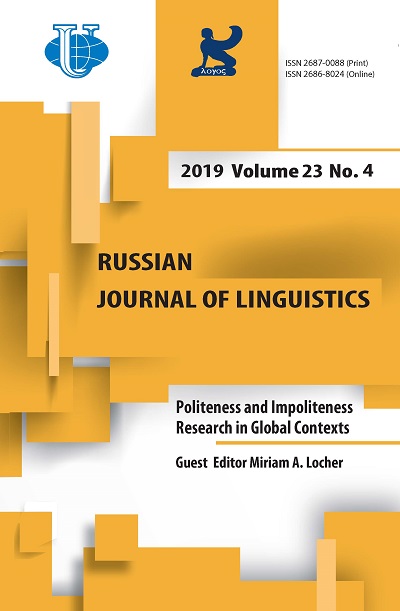Работа над межличностными отношениями в отзывах на сайте Airbnb
- Авторы: Эрнандес-Лопес М.д.1
-
Учреждения:
- Университет Пабло де Олавиде
- Выпуск: Том 23, № 4 (2019): Исследование вежливости и невежливости в глобальном контексте
- Страницы: 1088-1108
- Раздел: Статьи
- URL: https://journals.rudn.ru/linguistics/article/view/22532
- DOI: https://doi.org/10.22363/2687-0088-2019-23-4-1088-1108
Цитировать
Полный текст
Аннотация
В последнее время на таких онлайн-площадках, как Airbnb, которые дали толчок новым туристическим тенденциям, онлайн-отзывы потребителей становятся основным механизмом доверия и имеют троякую цель: принятие обоснованных решений относительно размещения, приобретение хорошей репутации и управление межличностными отношениями как продолжение офлайн-общения. В свете вышесказанного в данном исследовании будут проанализированы 120 отзывов (60 положительных и 60 отрицательных), написанных путешественниками, воспользовавшимися сайтом Airbnb. Они передают три различных эмоциональных состояния: восхищение/удовлетворение, амбивалентность/нейтральность и неудовлетворение/разочарование. Акцент будет сделан на иллокутивном и стилистическом аспектах с целью понять, как ведется работа по выстраиванию отношений, или «реляционная работа» (‘relational work’) (Watts 1989, Locher & Watts 2005, Locher 2006) и выяснить, что может быть «нормой» в этом конкретном жанре (электронном отзыве потребителей) и виртуальном сообществе (т.е. гости и хозяева отелей, общающиеся на сайте Airbnb). Результаты показывают, что нормой является вежливость, а грубость или оскорбление - это исключение. Полученные данные также свидетельствуют о том, что пользователи склонны проявлять вежливость посредством восторженных и очень дружелюбных сообщений, в то время как неудовлетворенность и амбивалентность проявляются имперсонифицированно, через официальный стиль и дистанцирование. Имплицитно информация о неудовлетворённости передается также через умолчание о тех или иных моментах. Представляется, что это понимают и члены данного сообщества, которые, по-видимому, воспринимают сообщение информации как необходимое условие оценки.
Ключевые слова
Об авторах
Мария де ла О Эрнандес-Лопес
Университет Пабло де Олавиде
Автор, ответственный за переписку.
Email: mariolahl@upo.es
преподает в Университете им. Пабло де Олавиде. Она имеет докторскую степень в области английского языка и лингвистики (университет Пабло де Олавиде) и степень магистра прикладной лингвистики (Биркбек, Лондонский университет).
Ctra. de Utrera, 1, 41013 Sevilla, SpainСписок литературы
- Angouri, Jo & Miriam A. Locher (2012).Theorising disagreement. Journal of Pragmatics, 44 (12), 1549-1553. https://doi.org/10.1016/j.pragma.2012.06.011.
- Arundale, Robert (1999). An alternative model and ideology of communication for an alternative to politeness theory. Pragmatics, 9, 119-153.
- Arundale, Robert (2006). Face as relational and interactional: a communication framework for research on face, facework and politeness. Journal of Politeness Research, 2, 193-217.
- Barros García, María Jesús & Marina Terkourafi (2014). First-order politeness in rapprochement and distancing cultures: Understandings and uses of politeness by Spanish native speakers from Spain and Spanish nonnative speakers from the U.S. Pragmatics, 24 (1), 1-34.
- Botsman, Rachel & Roo Rogers (2011). What’s Mine is Yours: The Rise of Collaborative Consumption. New York: Harper Business.
- Bridges, Judith & Camilla Vásquez (2016). If Nearly all Airbnb Reviews are Positive, Does that Make them Meaningless? Current Issues in Tourism, 19, 1-19. https://doi.org/10.1080/ 13683500.2016.1267113.
- Bulchand-Gidumal, Jacques & Santiago Melián-González (2019). Why are ratings so high in the sharing economy? Evidence based on guest perspectives. Current Issues in Tourism, 22. https://doi.org/10.1080/13683500.2019.1602597.
- Burt, Ronald (2000). The network structure of social capital. Research in Organizational Behavior, 22, 345-423.
- Cansoy, Mehmet & Juliet Schor (2016). Who gets to share in the sharing economy? Understanding patterns of participation and exchange on Airbnb. Retrieved from https://www.bc.edu/content/ dam/files/schools/cas_sites/sociology/pdf/SharingEconomy.pdf.
- Chairunnisa, Sabrina & A. S. Benedictus (2017). Analysis of Emoji and Emoticon Usage in Interpersonal Communication of Blackberry Messenger and WhatsApp Application. International Journal of Social Sciences and Management, 4 (2), 120-126.
- Dayter, Daria & Sofia Rüdiger (2014). Speak your Mind, but Watch your Mouth: Objectification Strategies in Negative References in CouchSurfing. In Bedijs, Kristina Held, Gudrun & Maab, Christiane (eds.) Face Work and Social Media. Berlin: LIT Verlag, 193-212.
- Dubé, Line, Anne Bourhis & Réal Jacob (2005). The impact of structuring characteristics on the launching of virtual communities of practice. Journal of Organizational Change Management, 18 (2), 145-166. doi: 10.1108/09534810510589570.
- Eckert, Penelope & Sally McConnell-Ginet (1992). Think practically and look locally: Language and gender as community-based practice. Annual Review of Anthropology, 21 (1), 461-488.
- Edwards, Derek (2000). Extreme case formulations: softeners, investment, and doing non-literal. Research on Language and Social Interaction, 33 (4), 347-373. https://doi.org/10.1207/ S15327973RLSI3304_01.
- Ert Eyal, Aliza Fleischer & Nathan Magen (2016). Trust and Reputation in the Sharing Economy: the Role of Personal Photos in Airbnb. Tourism Management, 55, 62-73.
- Fraser, Bruce (1990). Perspectives on politeness. Journal of Pragmatics, 14, 219-236.
- Garcés-Conejos Blitvich, Pilar (2010). A genre approach to the study of im-politeness. International Review of Pragmatics, 2, 46-94.
- Garcés-Conejos Blitvich, Pilar & Maria Sifianou (2019). Im/politeness in discursive pragmatics. Discursive politeness. Special issue of the Journal of Pragmatics: Recent developments in the field of pragmatics, guest edited by M. Haugh & M. Terkourafi, 145: 91-101.
- Guttentag, Daniel, Stephen Smith, Luke Potwarka & Mark Havitz (2018). Why Tourists Choose Airbnb: A Motivation-Based Segmentation Study. Journal of Travel Research, 57(3), 342-359. https://doi.org/10.1177/0047287517696980.
- Haugh, Michael (2019). The metapragmatics of consideration in (Australian and New Zealand) English. In: Ogiermann, E., Garcés-Conejos Blitvich, P. (eds.), From Speech Acts to Lay Understandings of Politeness. Cambridge University Press, Cambridge, 201-225.
- Hernández-López, María de la O (2019). What makes a positive experience? Offline/online communication and rapport enhancement in Airbnb positive reviews. Pragmatics & Society, 10 (2), 180-206. https://doi.org/10.1075/ps.16060.ohe.
- Hernández-López, María de la O & Lucía Fernández-Amaya (2019). What makes (im)politeness for travellers? Spanish tourists’ perceptions at national and international hotels. Journal of Politeness Research, 15 (2), 195-222. Doi: https://doi.org/10.1515/pr-2016-0060.
- Herring, Susan (2004). Computer-Mediated Discourse Analysis: An Approach to Researching Online Behavior. In S. Barab, R. Kling & J.H. Gray (eds.) Designing for Virtual Communities in the Service Learning. Cambridge: Cambridge University Press, 338-76.
- Ho, Victor (2017). Giving offense and making amends: How hotel management attempts to manage rapport with dissatisfied customers. Journal of Pragmatics, 109, 1-11.
- Kamoen Naomi, Maria Mos & Robbin Dekker (2015). A hotel that is not Bad isn’t Good. The Effects of Valence Framing and Expectation in Online Reviews on Text, Reviewer and Product Appreciation. Journal of Pragmatics, 75, 28-43.
- Levin, Irvin P., Sara K. Schnittjer & Shannon L. Thee (1998). Information Framing Effects in Social and Personal Decisions. Journal of Experimental Social Psychology, 24 (6), 520-529.
- Locher, Miriam A. (2006). Polite behavior within relational work: The discursive approach to politeness. Multilingua, 25, 249-267.
- Locher, Miriam A. & Watts, Richard J. (2005). Politeness theory and relational work. Journal of Politeness Research, 1 (1), 9-33.
- Locher, Miriam A. & Richard J. Watts (2008). Relational work and impoliteness: Negotiating norms of linguistic behaviour. In Dereck Bousfield and Miriam A. Locher (eds.) Impoliteness in Language. Studies in its interplay with Power in Theory and Practice. Berlin: Mouton de Gruyter, 77-99.
- Mills, Sara (2003). Gender and Politeness. Cambridge University Press, Cambridge.
- Pizam, Abraham (2014). Peer-to-peer travel: Blessing or blight? International Journal of Hospitality Management, 38, 118-119. doi: 10.1016/j.ijhm.2014.02.013.
- Rosen, Devan, Pascale R. Lafontaine & Blake Hendrickson (2011). CouchSurfing: Belonging and Trust in a Globally Cooperative Online Social Network. New Media & Society, 13 (6), 981-998.
- Spencer-Oatey, Helen (2000). Culturally Speaking: Managing Rapport Through Talk Across Cultures (1st ed.). London: Continuum.
- Spencer-Oatey, Helen (2008). Culturally Speaking: Culture, Communication and Politeness Theory (2nd ed.) London & New York: Continuum.
- Sthapit, Erose & Jano Jiménez-Barreto (2019). You never know what you will get in an Airbnb: poor communication destroys value for guests. Current Issues in Tourism, 22 (19), 2315-2318. https://doi.org/10.1080/13683500.2018.1475469.
- Torres, Edwin & Sheryl Kline (2013). From customer satisfaction to customer delight. International Journal of Contemporary Hospitality Management, 25 (5), 642-659. https://doi.org/10.1108/ IJCHM-Dec-2011-0228.
- Tussyadiah, Lis P. & Pesonen, Juho (2015). Impacts of Peer-to-Peer Accommodation Use on Travel Patterns. Journal of Travel Research, 12, 1-19.
- Vásquez, Camilla (2011). Complaints Online: The Case of TripAdvisor. Journal of Pragmatics, 43 (6), 1707-1717. https://doi.org/10.1016/j.pragma.2010.11.007.
- Vásquez, Camilla (2014). ‘Usually Not one to Complain but...’: Constructing Identities in User-Generated Online Reviews. In Seargeant, P. and Tagg, C. (eds.) The Language of Social Media: Identity and Community on the Internet. Basingstoke, UK: Palgrave Macmillan. https://doi.org/ 10.1057/9781137029317_4.
- Virtanen, Tuija (2017). Adaptability in online consumer reviews: Exploring genre dynamics and interactional choices. Journal Pragmatics, 116, 77-90. https://doi.org/10.1016/ j.pragma.2017.03.009.
- Watts, Richard J. (1989). Relevance and relational work: Linguistic politeness as politic behavior. Multilingua 8 (2-3), 131-166.
- Wong, Siu-Iun & Janet Salaff (1998). Network capital: emigration from Hong-Kong. The British Journal of Sociology, 49 (3), 358-374.
- Forbes (2018). Retrieved from: https://www.forbes.com/sites/hbsworkingknowledge/2018/02/27/ the-airbnb-effect-cheaper-rooms-for-travelers-less-revenue-for-hotels/#26fbfc79d672
- Sundadarajan, Arun (2014, November 27) What Airbnb gets about culture that Uber doesn’t. Harvard Business Review (Retrieved from https://hbr.org)

















